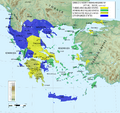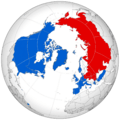Hegemony facts for kids
Hegemony is a big word that means one group or country has a lot of power and influence over others. It's like being the leader of a group, even if you don't directly control everyone. This power can come from being very strong militarily, or by having a lot of money and being able to set the rules for trade.
Hegemony often describes how a very powerful country influences smaller, less powerful countries nearby. The word comes from ancient Greece. It was first used to describe how a strong city-state influenced other cities that were allied with it.
A hegemonic relationship is usually seen as less than a full empire, but more than just a regular regional power. This means a country with hegemony might not take direct control of other nations. However, it has enough power to greatly influence what those nations do.
Contents
What is Hegemony?
Hegemony means that one country or group has a lot of power and influence over others. This power can be direct, like having a strong army. It can also be indirect, like being able to set the rules for buying and selling goods with other countries. This gives the powerful country an advantage.
A country that has hegemony is called a hegemon. It's like being the main leader or a very strong influencer.
Hegemony in History
The idea of hegemony has been around for a long time. We can see examples of it throughout history.
Ancient Examples
In ancient Greece, powerful city-states often had hegemony over their neighbors.
- The Peloponnesian League was led by Sparta. This league existed from the 6th to the 4th centuries BC. Sparta was the hegemon, guiding the actions of its allies.
- The Delian League was led by Classical Athens. This league was powerful for a short time.
- Later, the League of Corinth was led by a person, not a state. Philip II of Macedon was the hegemon, a king with great personal power.
These examples show how one strong state or ruler could guide many others without always taking full control.
Modern Examples
In more recent times, we can also see examples of hegemony.
- The Roman Empire was a huge empire that directly controlled many lands. But even before it became a full empire, Rome had a lot of influence over its neighbors.
- The British Empire was once the largest empire in history. It had a lot of power and influence around the world. Even in places it didn't directly rule, its economic and political power was immense.
- During the Cold War (from 1949 to 1990), two superpowers, the Soviet Union and the United States, had a lot of influence over world affairs. They led different groups of countries. This was a form of global hegemony, where these two nations shaped many international events.
Images for kids
-
Ancient Greece under the hegemony of Thebes, 371–362 BC
-
The Roman Empire at its greatest extent, 117 AD
-
The Iberian Union in 1598, under Philip II, King of Spain and Portugal
-
Map of the British Empire (as of 1910). At its height, it was the largest empire in history.
-
The Soviet Union and the United States dominated world affairs during the Cold War
See also
 In Spanish: Hegemonía para niños
In Spanish: Hegemonía para niños






